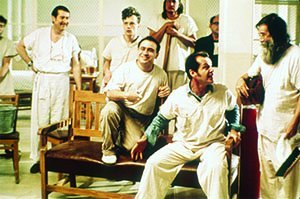One Flew Over The Cuckoo’s Nest

|
In One Flew Over The Cuckoos Nest, Jack Nicholson plays Randle McMurphy a repeat offender who feigns mental illness in order to escape hard prison labour and get what he thought would be an easier ride in a mental institution. Once there he enters a ward under the tyrannical rule of the maniacal antagonist Nurse Ratched (expertly played by Louise Fletcher), who mistreats her patients and abuses both her position of power and duty of care. Despite McMurphy’s sardonic uncaring exterior his eccentric ward-mates endear themselves to him and so he begins a beautiful rebellion to help these people get better and escape the evil rule of Ratched, whilst being dogged by her at every opportunity. A beautiful insight into the human condition, adversity and the treatment and understanding of mental health (especially in an era before it was truly understood), this movie is both charming and meaningful, and beautifully held together by the amazing dynamic between and acting of Nicholson and Fletcher. Often lauded as one of the best films ever made, its immense acting, engaging plot and emotional ending helped this film to be one of the only three films ever to win all five of the big Academy Awards (Best Picture, Best Actor, Best Actress, Best Director, Best Screenplay). You may laugh, you may cry, but you certainly won’t leave disappointed.
Andrew Kersley
Winner of five Oscars and set in a mental institution in the early 1960s, this film deals with repression, rebellion and individuality, and the impact (or lack of) an individual can have on an established system. Randle McMurphy (Nicholson) has just very unwisely managed to con his way out of prison and into what he considers a cushy mental institution, not realising he has now switched from serving a sentence with a release date to being committed until adjudged sane. Already a little eccentric, McMurphy has to try and be judged sane by the very people who he winds up on a daily basis. The film follows the journey of McMurphy and the other “cuckoos” as they deal with possibly the most vicious sadist in film history, Nurse Ratched. Representing the worst kind of matronly authoritarianism, Nurse Ratched tends to her own ego instead of her patients. While the film starts out as what seems more comedy than any other genre, the hold of the system becomes grossly apparent on the patients and there is poignancy, sadness and empathy. McMurphy provides hope and enthusiasm to the ward which is not normally possible under Ratched’s rule. Disliking him intensely, Ratched fights back and the film’s climax involves McMurphy going too far and trying to kill her. The result of this is shocking and drives the meaning of the film home to great effect.
Incredibly intelligent and witty,
Victoria Galloway
More Information | Back to Previous Schedule | This Season | BBFC Classification Guidelines
Screenings of this film:
| 1977/1978 Summer Term – (35mm) |
| 1977/1978 Summer Term – (35mm) |
| 1979/1980 Summer Term – (16mm) |
| 2017/2018 Spring Term – (digital) |


